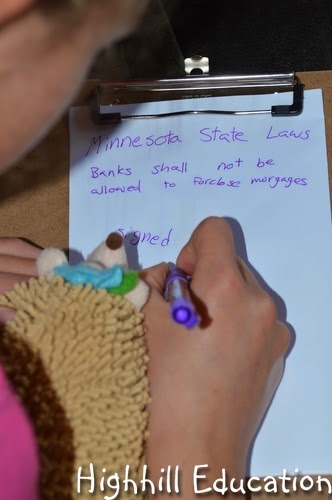Today a large percentage of the American population feels entitled to certain benefits. Many feel the government should provide for people. In the Freedom Answer Book by Judge Andrew P. Napolitano, he addresses many aspects of the constitution and how Government Laws and Policies have changed the United States Government and served to slowly move the United States in the direction of a country in which Government Policy tries to protect the people but actually creates greater damage.
In the court case Home Building & Loan Association v. Blaisdell, the court had to choose between two conflicting laws. The first was the Contract Clause of the Constitution and the second was a law passed by the State of Minnesota preventing lenders from foreclosing mortgages. The law was passed during the Great Depression and meant to slow down the effects of the depression while helping citizens get back on their feet. However, the law was in direct conflict with the Constitution.
The decision the courts ultimately made was to uphold the Minnesota law thereby protecting citizens from their own financial problems and ignoring the Contracts Clause of the Constitution. According to the book, it marked a turn away from the constitution and a turn toward the government protecting the common good. Here's a quote.
The Court was no longer concerned about keeping the markets open and free. It was no longer concerned with keeping the government small. It was no longer concerned with enforcing freely consented-to agreements. Its new priority was "the common good" and making sure the government would provide for it.
The court decided in favor of the Minnesota law, but I wanted to see how my kids would decide the case.
First the small hedgehog named Vegie 3, decided to purchase a house from the pink hedgehog named Snowflake.
They wrote out a bill of sale and both signed.
Next, Vegie 3 secured a loan from Hedgie, the banker.
Hedgie agreed to loan Vegie 3 $70,000 and Vegie 3 agreed to give Hedgie $1000 per month for 70 months and agreed to give Hedgie the house if she didn't pay. Hedgie did not charge interest.
Next, the hedgehogs working in the government decided to pass a new law. Banks shall not be allowed to foreclose mortgages. They discussed how sometimes people (or hedgehogs) sometimes just need a little time to get back on their feet. When they are down-and-out taking their house can only make matters worse for them.
The government wrote and signed the law.
Then Vegie 3 went to work. She earned $2000 per month and happily gave Hedgie $1000 each month. The rest she sometimes saved and sometimes used to purchase food and go on vacation. Everything went fine until October came. Vegie 3 was told she was no longer needed at work. She tried desperately to find a job. She asked the bank if they were hiring, the government and even the courthouse, but nobody had any work for Vegie 3. After a few more months she ran out of money and was brought to court.
Hedgie wanted her money, but Vegie 3 couldn't pay. Therefore, Hedgie asked for the house. She brought her signed contract as evidence to present to the judges. Vegie 3 apologized for not paying, but said she couldn't and shouldn't have to because there was a law that said her house couldn't be taken away.
Obviously, this case was greatly simplified so that it could be understood by young children. Nonetheless, it presented an opportunity for discussion and consideration of significant issues.
The kids really had a difficult time deciding this case. They wanted to rule in favor of Hedgie, but provide a one year time period for Vegie 3 to find a new job. I instructed them that that was not an option. The case needed to be decided on the basis of which law took priority and was more important.
Their final verdict - Hedgie wins! Hedgie gets the house and will give Vegie 3 $10,000. The amount repaid on the loan. The reason - Vegie 3 did not pay. Hedgie loaned Vegie 3 money without interest, and the contract said she must pay the money back or she would loose the house. Hedgie is out a significant amount of money and needs her money back. Maybe Vegie 3 could find a job. She's smart. Unfortunately now she's jobless and houseless. Maybe she could find a rich husband, maybe she could sell her car to get some money, or maybe she could find a lower paying job like a food bagger at a grocery story. It's not really Hedgie's concern what Vegie 3 does. Hedgie feels bad, but doesn't deserve to loose the money she loaned.
I think in the end they decided the case on the basis of right and wrong. Regardless of whether a written law protects contracts or forbids the foreclosing of loans, they could see that the hedgehogs made a deal, one broke the deal, and the deal seemed reasonable.Therefore, it was fair that the remaining (yet undesirable) portion of the contract to be enacted.

Check out these great blogs full of educational activity ideas.













I really enjoyed this blog, until now.
ReplyDeleteI really enjoyed this blog, until now.
ReplyDeleteI'm sorry you feel that way. I never meant to trivialize yours or anyone elses financial hardships. There are definitely times whens people need a little extra help, and as humans we should help one another. Help should begin with immediate family, expand to friends, and then community during extremely tough times. It should never be mandated or expected, and should never come at the expense of personal freedom to make decisions.
DeleteA well done exercise! I like how your kids were able to separate their feelings and emotions from their recognition of right and wrong and fair dealing.
ReplyDelete